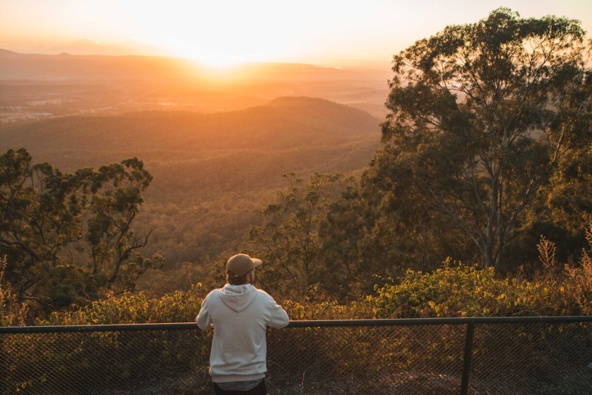Have you ever been to Toowoomba? No, neither had I. Changing the habit of a lifetime on a recent road-trip in Queensland, I took the 2 hour drive west of Brisbane to the Great Dividing Range, where Woombie or Tbar as the locals call it, clings to the escarpment, 700 metres above sea level.
As you enter from the east, the city seemingly dangles on the edge of the elevated plateau, overlooking the undulating green patchwork of the Lockyer Valley. Beyond the city limits of this sprawling country hub, Toowoomba is enrobed by the agricultural powerhouse of the Darling Downs region.
Toowoomba is Australia’s largest inland city and it’s Queensland’s Garden City, playing host to a fiendishly popular Carnival of Flowers in September - the longest running floral event of its kind in Australia. It welcomes hundreds of thousands of hyper-coloured flowers in full bloom, planted across the city’s parks and public spaces. But it’s not just the plants that attract out-of-towners. A glut of gorgeous, manicured gardens lie within the city’s boundaries, graced with stately homes and broad tree-lined streets.

To help get my bearings, I joined a two hour guided excursion with Lindsay from Toowoomba Sightseeing, introducing me to the city staples, from the historic CBD to panoramic vistas over the range. Lindsay remarked that Toowoomba is like a volcanic saucer, with rich red soils. “Everything grows here.” An essential stop is at Picnic Point, located on the eastern side of Toowoomba, serving up enormous views across the topographical grandeur of the region. A picturesque highlight is the imposing sight of Table Top Mountain.
Its name is rather self-explanatory and looks like a mesa from the American Southwest. 600 metres high, the two-hour return climb itself is quite demanding with a lot of large steps over the Camel's Hump and a scramble just before the summit. Used as a training track for hikers prepping for Mount Kilimanjaro and the Kokoda Trail for years, stick to the well-worn trail. But the sweet reward is at the summit, flat-topped and treeless, is the unrivalled horizon-wide panoramic fix. Back in the city, street art is one Toowoomba’s calling cards, with a spree of laneways, building walls and public spaces vividly cast in eye-catching works. There’s a dedicated Street Art Trail that weaves many of the works together, including Mark Lane, Bank Lane and Searle’s Walk.

But it’s Neil Street where most of the action is, with over 50 murals to feast your eyes on. Adding further texture and character to the city centre, Toowoomba’s old bones have been lovingly preserved, with impeccably maintained facades gracing the city centre and some showpiece buildings, including more than 50 heritage-listed sites. The bedazzling 1911 Empire Theatre is the pride of locals, with its resplendent art deco lobby. Then there’s the old post office and courthouse, venerable sandstone masterpieces from the late 19th century.
For a complete change of scenery, I headed to Ju Raku En, the delightful Zen-like Japanese Gardens, located at the University of Southern Queensland. I spent an hour casually zoned out admiring the five-hectare garden, crowned with a rippling lake, carefully aligned boulders, conifers, bamboo stands, cherry blossom trees, photo perfect bridges and curvaceous paths, in one of the largest Japanese gardens in Australia.
Next up, The Cobb & Co Museum which is home to the National Carriage collection’s huge array of vehicles, horse-drawn carriages, outback memorabilia, and extensive displays. The National Carriage Collection comprises 47 restored horse-drawn vehicles, which played an important role in Queensland’s development. Established in 1853 by Freeman Cobb with the intention of initially servicing the Victorian goldfields, Cobb & Co quickly developed to become the most successful company of its kind in Australasia during the 19th Century, pioneering transport routes, delivering mail, gold and passengers throughout Australia and New Zealand, contributing greatly to social growth and the expansion of pastoral settlement.

The map inside the Cobb and Co Museum of its transport routes is incredible, taming the vast distances across the likes of Queensland. At its peak, Cobb & Co operated along a network of tracks that extended further than those of any other coach system in the world – its coaches travelled nearly 45,000km per week, powered by a fleet of 30,000 horses. The last Australian Cobb & Co stagecoach ran in Queensland in 1924.
Feeling peckish, I can testify that the heart of town boasts a host of enticing cafes. Any self-respecting eatery in these parts proudly touts a national icon – the Lamington. Why? Because Toowoomba has been deemed the birthplace for this much-loved Australasian treat. The story goes that the chocolate-coated and coconut encrusted family favourite was first crafted in 1896 in the sultry Queensland summer, when Lord Lamington, the Governor of Queensland, moved his entourage to Harlaxton House in Toowoomba to escape Brisbane’s heat. He had a particular liking for ‘snowballs,’ those round rolled cakes served with whipped cream, for afternoon tea.
Soon after arriving one summer, Lady Lamington asked the cook to whip up a batch, but much to the cook’s horror, Harlaxton House kitchen was not equipped with the patty pans used to devise them. To make matters worse there was no cream in the larder! The cook improvised by making a big plain cake which she cut into oblongs, icing the tops and sides with chocolate and sprinkling with coconut. The Governor and his guests were enthralled with the new treat. Lady Lamington was asked what the cakes were called. When told they had no name, the guests dubbed them ‘Lord Lamington’s Cakes.’ And the rest is history. Or is it? Hold the cake!
You may recall some years ago, Auckland University researchers revealed that Lord Lamington visited Wellington in 1895, before becoming Queensland governor, and he was most impressed with the local sweets provided. According to a NZ Herald article at the time, among those sweets was a “Wellington – a double sponge dessert, dressed in shavings of coconut intended to imitate the snow-capped mountains of New Zealand.” You be the judge on the lammo’s true origin.
Like the Lamington, Toowoomba is home to plenty of homes that have stood the test of time, none more so than venerable Queenslanders. Get an architecture fix wandering down the Russell Street Historical Walk, all the way back to the 1860s. There’s 2.5km of Queenslanders as well as other architectural styles.

Where to stay? Bed down in Toowoomba’s accommodation treasure chest, the most sublime historic boutique hotel, Vacy Hall. First built on leafy Russell St in 1873, fire destroyed the original building and it was replaced by the current masonry building in 1899. This heritage-listed gem speaks to Toowoomba’s development as a prestigious residential location for Darling Downs pastoralists in the 19th century. James Taylor was one of those pioneering pastoralists and the first Vacy Hall was commissioned by him as a wedding present for his daughter. Set in over an acre of beautiful gardens, Vacy Hall beckons as one of Australia’s great historic hotels. It offers charm, soul and atmosphere in spades.
In fact, after stepping inside, I thought there was a certain presence about the place. Sure enough, the property’s long-time owner and convivial host, Graham Higgins confirmed the house is haunted, in a no-nonsense, matter-of-fact fashion. Although Graham quickly added that he hasn’t personally had any encounters, but numerous staff and past guests have. An absolute rockstar on TripAdvisor, guests understandably rave about the beautiful rooms, lavish art, wraparound verandah, magnificent garden and gracious hospitality. I felt like I was sleeping in an antique art gallery, finely curated and cushioned with homely comforts. Just inside the front door, two billowing piles of old leather suitcases, stacked theatrically high, seemingly serving as a monument to the timeless joy of great journeys.

My roost for the night was the Luxury Emperor Suite. In 1880, they didn’t make beds any bigger than the exquisite Emperor sized all brass four-poster with a lace canopy that takes pride of place in this suite. And I thought Californian kings were big! My Emperor four-poster was so large, I’m sure each side of the bed resided in different post codes. This luxury suite is all about grand proportions, from the large open fireplace with its original antique mantle-piece, to the big comfy leather chesterfield.
The chequerboard-floored en-suite bathroom, with its spoil of brass fittings, is another thrill. Waking up to a full cooked breakfast, wheeled in on a trolley, was the cherry on top of this stylish, evocative stay. It’s a one-of-a-kind experience, in the lap of time-honoured luxury. https://vacyhall.com.au/
Right across the road, enjoy dinner in Gip’s restaurant, is located in one of Toowoomba’s most historical buildings, Clifford House. This was the residence of James Taylor and the restaurant is housed in what used to be the grand old home’s Billiard Room. If the sun is shining, pull up a seat under the lush shade of the Jacaranda trees. Owners Jon and Julianne McCorley have preserved a slice of the city’s past by naming the restaurant after the much-loved pet dog of the historical owner, James Taylor. A rock commemorating Gip’s passing can still be found in the grounds today. Proudly celebrating regional produce, I highly recommend the Pan-seared Coral Coast Barramundi or the Moreton Bay Bug Ravioli.
Queensland is good to go. Planning a winter escape to the Sunshine State? Discover everything Queensland has to offer. Explore destinations, experiences and events to maximise your getaway. Make your first port of call the official website. www.queensland.com
Mike Yardley is our resident traveller on Jack Tame Saturday Mornings.
Take your Radio, Podcasts and Music with you










